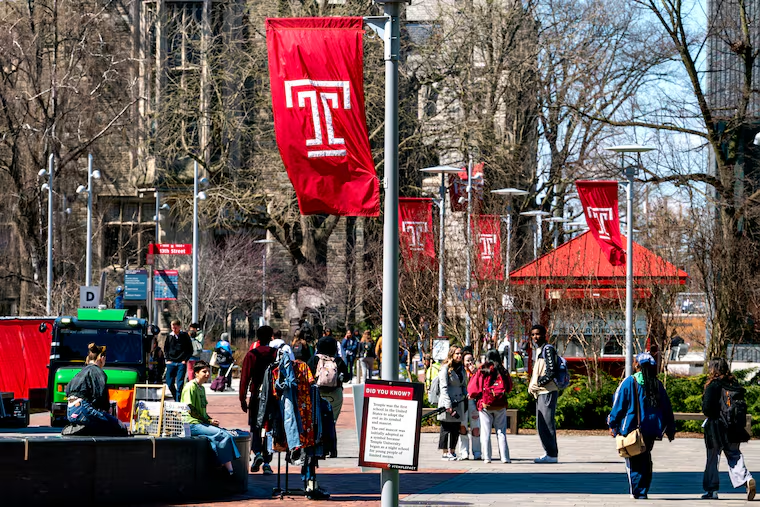Temple, Pitt, Penn State, and Lincoln funding uncertainty leaves students on edge
The four universities receive state funding that helps them offer significant tuition discounts to students who live in Pennsylvania. That money is currently uncertain without a state budget in place.

Students at four Pennsylvania universities that rely on state funding are worried about the status of their in-state tuition discounts amid a state budget impasse.
Pennsylvania’s state-related universities — Temple, Penn State, the University of Pittsburgh, and Lincoln University — receive a total of more than $600 million in annual state appropriations. But that funding is currently uncertain without a state budget in place. Lawmakers also must pass bills specifically authorizing funding for the four universities, which House Republicans have blocked this year, saying they’d like greater oversight of the institutions.
While a short impasse is unlikely to have a significant impact on the universities, an extended delay could jeopardize in-state tuition discounts, which reduce annual costs by thousands of dollars for Pennsylvania residents.
“I am honestly glad I only have one year left,” said Allison O’Toole, an incoming senior at Temple from northeastern Pennsylvania.
» READ MORE: What you need to know about the Pa. budget impasse
Temple is increasing tuition by more than 4% for the 2023-2024 school year for Pennsylvania and out-of-state students, and fees are also increasing. In-state students will pay a base tuition of $17,979 for next year, while out-of-state students will pay $32,376.
During the lengthy 2015 state budget impasse, which lingered into March 2016, Temple was able to maintain its in-state tuition discount but many students were still forced to take out higher loans than initially expected until funding officially cleared.
“There is no overstating the vital role of the commonwealth support in helping make the highest quality education accessible to Pennsylvania college students and their families,” a Temple spokesperson wrote in an emailed statement.
O’Toole said scholarships and government loans were enough to cover her freshman year of college, but she had to take out a private loan to help pay for her sophomore year tuition. She will have to take out another private loan if in-state tuition increases further, she said.
“It’s hard as someone who only makes about $600 a month during the school year, especially with all the bills I have to pay,” O’Toole said.
What are universities and state officials saying about in-state tuition discounts?
Several efforts to pass legislation authorizing funding for the universities have failed to get the two-thirds majority vote needed to pass the House. A bill providing Lincoln with $16 million passed the House, but the university won’t receive the funding until the Senate approves the bill and a state budget is finalized.
Republicans have resisted the funding in recent years, but it has eventually been approved. Lawmakers have cited reasons related to fetal tissue research at Pitt and Penn State Health system providing gender-affirming care to minors.
On Thursday, State Rep. Seth Grove (R., York) held a news conference detailing the current state of budget negotiations and said he is confident that the state-related universities would have raised tuition regardless of the impasse.
“They’re going to be raising tuition regardless of what happens,” Grove said. “That is the universities making those decisions. Whether this passes or not, they are going to make those decisions based on their finances.”
The entirety of Pitt and Temple’s state appropriations go toward providing Pennsylvania students an in-state discount. Both schools also use their own funds each year to almost double that discount.
Penn State’s Board of Trustees met Thursday and approved a plan to increase tuition rates by 2% for in-state undergraduates at the university’s main campus while freezing tuition rates at the university’s 19 Commonwealth campuses. The plan must still get a final vote of approval by the full board of trustees, which is scheduled to meet Friday afternoon.
A spokesperson for Pitt declined to say whether the school was considering raising in-state tuition rates if the state appropriation didn’t come through.
“We are optimistic that state lawmakers will do the right thing and continue to support higher education in Pennsylvania,” Pitt wrote in an emailed statement. “In the previous fiscal year, endowment earnings were a greater source of revenue than what was received in state funding.”
Lincoln University president Brenda Allen said the school will continue to offer an in-state tuition discount, but the school is closely monitoring the state budget situation.
“Lincoln University is all about creating opportunity for students through education, and that opportunity is hanging in the balance,” Allen said. “We’re closely managing our budget and watching the conversation in the legislature as it unfolds.”
Janeen Hall, a parent of a third-year Lincoln student, said higher tuition rates for in-state students would result in a drop in enrollment, an issue many historically Black colleges and universities such as Lincoln are already facing.
Lincoln’s average in-state tuition rate is more than $14,000 a year. Currently, Hall is able to cover the majority of that cost through financial aid and private scholarships. But if tuition were to be raised any higher, she said, she would have to consider private loans.
“As a single parent with two college enrolled children, I rely on the affordability of lower in-state tuition,” Hall said. “A significant change in cost would impact not only myself but many other families. Families are just starting to be able to financially recover from the impact of COVID-19.”